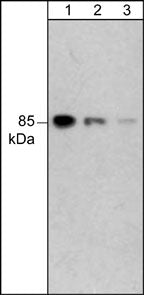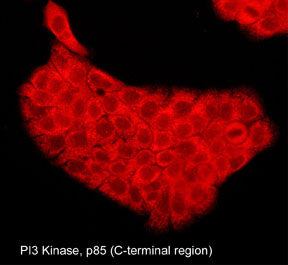Anti-PI3 Kinase, p85 (C-terminal region) Antibody
- SPECIFICATION
- CITATIONS
- PROTOCOLS
- BACKGROUND

Application
| WB |
|---|---|
| Primary Accession | P27986 |
| Reactivity | Bovine, Chicken |
| Host | Mouse |
| Clonality | Mouse Monoclonal |
| Isotype | IgG2a |
| Clone Names | M253 |
| Calculated MW | 83598 Da |
| Gene ID | 5295 |
|---|---|
| Other Names | PI3K |
| Dilution | WB~~1:1000 |
| Storage | Maintain refrigerated at 2-8°C for up to 6 months. For long term storage store at -20°C in small aliquots to prevent freeze-thaw cycles. |
| Precautions | Anti-PI3 Kinase, p85 (C-terminal region) Antibody is for research use only and not for use in diagnostic or therapeutic procedures. |
| Shipping | Blue Ice |

Thousands of laboratories across the world have published research that depended on the performance of antibodies from Abcepta to advance their research. Check out links to articles that cite our products in major peer-reviewed journals, organized by research category.
info@abcepta.com, and receive a free "I Love Antibodies" mug.
Provided below are standard protocols that you may find useful for product applications.
Background
Phosphoinositide 3-kinase (PI3K) phosphorylates phosphatidylinositol (PI), PI-4-phosphate and PI-4,5-bisphosphate to catalyze the production of PI-3,4,5-triphosphate. Growth factors and hormones activate PI3K to coordinate various cellular events, such as cell growth, cell cycle entry, cell migration and cell survival. This PI3K activation is reversed by PTEN. In cancers caused by the loss of PTEN activity, PI3K is constituitively active and promotes cell proliferation. PI3Ks are composed of a catalytic subunit and a regulatory subunit. Various isoforms of the catalytic subunit (p110a, p110b and p110d) associate with regulatory subunits (p85a and p85b) with the exception of p110g which interacts with a unique p101 regulatory subunit.
If you have used an Abcepta product and would like to share how it has performed, please click on the "Submit Review" button and provide the requested information. Our staff will examine and post your review and contact you if needed.
If you have any additional inquiries please email technical services at tech@abcepta.com.













 Foundational characteristics of cancer include proliferation, angiogenesis, migration, evasion of apoptosis, and cellular immortality. Find key markers for these cellular processes and antibodies to detect them.
Foundational characteristics of cancer include proliferation, angiogenesis, migration, evasion of apoptosis, and cellular immortality. Find key markers for these cellular processes and antibodies to detect them. The SUMOplot™ Analysis Program predicts and scores sumoylation sites in your protein. SUMOylation is a post-translational modification involved in various cellular processes, such as nuclear-cytosolic transport, transcriptional regulation, apoptosis, protein stability, response to stress, and progression through the cell cycle.
The SUMOplot™ Analysis Program predicts and scores sumoylation sites in your protein. SUMOylation is a post-translational modification involved in various cellular processes, such as nuclear-cytosolic transport, transcriptional regulation, apoptosis, protein stability, response to stress, and progression through the cell cycle. The Autophagy Receptor Motif Plotter predicts and scores autophagy receptor binding sites in your protein. Identifying proteins connected to this pathway is critical to understanding the role of autophagy in physiological as well as pathological processes such as development, differentiation, neurodegenerative diseases, stress, infection, and cancer.
The Autophagy Receptor Motif Plotter predicts and scores autophagy receptor binding sites in your protein. Identifying proteins connected to this pathway is critical to understanding the role of autophagy in physiological as well as pathological processes such as development, differentiation, neurodegenerative diseases, stress, infection, and cancer.



